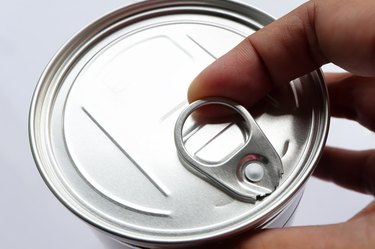
There are several methods of identifying your recyclables as aluminum or steel cans. Steel cans may be allowed in your recycling bin, but in many locations, you can turn in aluminum cans for cash. This varies by state, with some states requiring a refundable deposit of 5 to 10 cents or more. Even if your state doesn't have a deposit on beverage containers, you may be able to take your cans to recycling centers that will weigh them and pay the current rate for scrap aluminum.
Aluminum Cans and Recycling
Video of the Day
While beverages had been sold in cans since 1938, aluminum wasn't introduced in can-making until 1957. Coors introduced the first all-aluminum beer cans in 1959, followed in 1963 by a now-defunct diet cola called "Slenderella." The major soda companies quickly followed, and by 1967, nearly all carbonated beverages were packaged in all-aluminum cans.
Video of the Day
Recycling has been common throughout American history, particularly during World War II, but the big push for trash cleanup and recycling didn't grab the public's attention until 1971. The famous Keep America Beautiful campaign featuring Iron Eyes Cody (actually an Italian-American actor) as the Native American crying over the polluted waterway and littering jump-started modern anti-littering and recycling efforts.
State-mandated deposits and refunds began appearing in 1971. Still, in spite of a multitude of recycling and save the planet campaigns, by 2020, only 10 states and the territory of Guam require a deposit on aluminum, glass or plastic containers. Aluminum is the success story of recycling, with new beverage cans containing up to 73 percent recycled materials.
Look for Deposit Information
When sorting your recyclables, look at the side and top of the can. If a metal can displays a deposit of 5 or 10 cents and state abbreviations, it is usually aluminum. This information may be printed on the side, near the bar code or embossed on top of the can.
Examine the Bottom
If you aren't sure, look at the bottom of a beverage can. Aluminum cans are extruded in one piece with a rounded bottom. The top of the can is a separate piece that usually features a stay-on-tab, which is attached to the can. These tabs were introduced in 1975; previously, beverage cans used a ring pull tab that was often discarded instead of being recycled with the can.
Most but not all steel cans have a seam up one side and a separately attached top. If a steel can has a pull tab, the entire top comes off to allow you to pour its contents into a bowl or pan.
Squeeze the Can
If the can is weathered or the label is scratched off, simply squeeze it. The sides of aluminum cans are thinner and lighter than steel cans. You can easily squash an aluminum can with one hand or step on it to smash it flat. A steel can won't bend as easily. Use caution if stomping on the can because you might hurt your foot.
In addition, try scratching the can with a house or car key. It will produce deep gouges on aluminum but barely scratch a steel can.
Check for Labels
Aluminum beverage cans usually have the brand name, nutritional information, size and bar code printed directly on the metal. In contrast, many food items, such as canned beans, vegetables and fruits, are packaged in steel cans and usually have a paper label. If you put steel cans in your disposal company's recycle bin, rinse the cans and remove the paper labels.
Use a Magnet
In addition to the other indications of the can's material, you can use a magnet to separate aluminum and steel cans. Magnets won't stick to aluminum. They will stick to steel cans. Sort your recycling accordingly so you can recover the deposit or scrap value of the aluminum at the local recycling center.
- Middle Georgia State University: Recycling Facts
- Encore Recyclers: How to Tell the Difference Between Aluminum and Stainless Steel
- The Aluminum Association: Aluminum Cans - Packaging for a Sustainable Future
- Time: The History of Recycling in America Is More Complicated Than You May Think
- National Conference of State Legislatures: State Beverage Container Deposit Laws